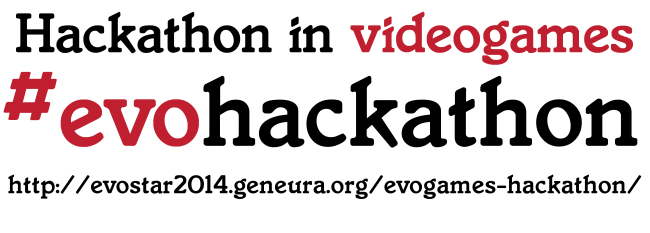JavaScript, despite its age, is considered now an emergent language, since it is starting to have a ecosystem that allows the development of complex and high-performance applications. That is why in the recent EvoStar we had a poster that uses evolutionary algorithms libraries written using it. It is based on MOOTools to create an object-oriented browser-based library called jsEO, and is entitled An object-oriented library in JavaScript to build modular and flexible cross-platform evolutionary algorithms.
Archivo por meses: abril 2014
Dynamic and Partially Connected Ring Topologies for Evolutionary Algorithms with Structured Populations
by Carlos Fernandes, Juan Laredo, Juan Merelo, Carlos Cotta, Agostinho Rosa
in EvoPAR
This paper investigates dynamic and partially connected ring topologies for cellular Evolutionary
Algorithms (cEA). We hypothesize that these structures maintain population diversity at a higher level and reduce the risk of premature convergence to local optima on deceptive and NP-hard fitness landscapes. A general framework for modelling partially connected topologies is proposed and three different schemes are tested. The results show that the structures improve the rate of convergence to global optima when compared to cEAs with standard topologies (ring, rectangular and square) on quasi-deceptive, deceptive and NP-hard problems. Optimal population size tests demonstrate that the proposed topologies require smaller populations when compared to traditional cEAs.
Unreliable Heterogeneous Workers in a pool-based evolutionary algorithm
by Mario Garcia-Valdez, Juan-J. Merelo, Francisco Fernández de Vega
in EvoAPPS posters
In this paper the effect of node unavailability in algorithms using EvoSpace, a pool-based evolutionary algorithm, is assessed. EvoSpace is a framework for developing evolutionary algorithms (EAs) using heterogeneous and unreliable resources. It is based on Linda’s tuple space coordination model. The core elements of EvoSpace are a central repository for the evolving population and remote clients, here called EvoWorkers, which pull random samples of the population to perform on them the basic evolutionary processes (selection, variation and survival), once the work is done, the modified sample is pushed back to the central population. To address the problem of unreliable EvoWorkers, EvoSpace uses a simple re-insertion algorithm using copies of samples stored in a global queue which also prevents the starvation of the population pool. Using a benchmark problem from the P-Peaks problem generator we have compared two approaches: (i) the re-insertion of previous individuals at the cost of keeping copies of each sample, and a common approach of other pool based EAs, (ii) inserting randomly generated individuals. We found that EvoSpace is fault tolerant to highly unreliable resources and also that the re-insertion algorithm is only needed when the population is near the point of starvation.
Tree depth influence in Genetic Programming for generation of competitive agents for RTS games
by Pablo García-Sánchez, Antonio Fernández-Ares, Antonio Miguel Mora, Pedro Ángel Castillo, Juan Julián Merelo, Jesús González
in EvoAPPS posters
This work presents the results obtained from comparing different tree depths in a Genetic Programming Algorithm to create agents that play the Planet Wars game. Three different maximum levels of the tree have been used (3, 7 and Unlimited) and two bots available in the literature, based on human expertise, and optimized by a Genetic Algorithm have been used for training and comparison. Results show that in average, the bots obtained using our method equal or outperform the previous ones, being the maximum depth of the tree a relevant parameter for the algorithm.
More info is available at the OSGiLiath Evolutionary Framework webpage.
Co-Evolutionary Optimization of Autonomous Agents in a Real-Time Strategy Game
by Antonio J. Fernández Ares, Antonio M. Mora, Maribel García Arenas, Pablo García Sánchez, Juan Julian Merelo Guervós, Pedro A. Castillo in EvoAPPS posters
An object-oriented library in JavaScript to build modular and flexible cross- platform evolutionary algorithms
by Victor Manuel Rivas Santos, Maria Isabel Garcia Arenas, Juan Julian Merelo Guervos, Antonio Mora Garcia and Gustavo Romero Lopez.
In EvoAPPS posters (see the poster at slideshare)
Evolving Evil: Optimizing Flocking Strategies through Genetic Algorithms for the Ghost Team in the Game of Ms. Pac-Man
The performance of the methodology proposed is tested and compared with that of other standard controllers belonging to the framework of the Ms. Pac-Man versus Ghosts Competition. The results show that flocking strategies are capable of modelling complex behaviors and produce effective and challenging agents.
The presentation is:
You can also see a brief demo here (we are the ghosts :D):
Enjoy it!
(And cite us, of course :D)
Hackathon in Videogames at EVO* 2014
Hi to all,
Finally, the EVOHackathon will be held in the Oficina de Software Libre on Tuesday 22 April (one day before EVOGames conference).
There are 5 projects confirmed right now,namely:
- Creating autonomous agents for Super Mario Bros. game
- Creating an AI engine for the game Wetland (Greyman Studios)
- Creating bots for 1 vs 1 combats in the RTS Planet Wars
- Procedural generation of stages for a new game (Greyman Studios)
- Progamer: Code visualization tool based in Super Mario Bros. levels
As you can see, two of them are proposed and will be directed by a videogames company.
We invite you to join us. It is free! :D
